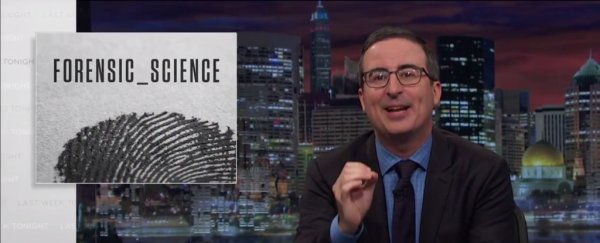We love it when comedian John Oliver goes on one of his epic science rants, and now he's taken cutting aim at everyone's favourite bugbear: forensic science.
We've all seen at least one scene on a crime show where forensic scientists line two images up on a computer screen, showing an exact match, or where, if the detectives can just get a DNA sample from their suspect, they'll have them hook, line and sinker.
"Prosecutors often complain about a so-called 'CSI effect', where jurors expect to see forensic evidence in every case," Oliver said in the October 1 episode of Last Week Tonight with John Oliver.
"The problem is, not all forensic science is as reliable as we've become accustomed to believe."
He cited a 2009 report by the National Academy of Sciences, which, Oliver said, found that "many forensic sciences" don't meet the "fundamental requirements of science" (although it's worth pointing out that the full quote from the report reads, "Some non-DNA forensic tests do not meet the fundamental requirements of science, in terms of reproducibility, validity, and falsifiability").
A report last year by the President's Council of Advisors on Science and Technology also noted that expert witnesses often overstate the probative value of their evidence.
The problem, Oliver says, is the phrase that expert witnesses are encouraged to use: "To a reasonable degree of scientific certainty".
This sounds good on paper, and in the witness box, but doesn't have a generally accepted definition and can be interpreted as the individual chooses, and can be taken as implying absolute certainty.
"When bad science is confidently presented, terrible convictions can happen," Oliver said. "In fact, among the hundreds of people who have been exonerated by DNA testing since 1989, in nearly half of their cases, there was some misapplication of forensic science."
There are so many places where forensic evidence can go wrong.
It can be mishandled or contaminated; a lab tech may be falsifying records, as was uncovered last year; errors can occur in the analysis; in one notable case, DNA from a worker at the cotton swab factory contaminated everything the detectives swiped with those swabs.
Perhaps above all, forensic sciences are often inexact. Bite mark analysis, for instance, cannot be relied upon for evidence, and there have been many convictions decided by bite mark analysis that have since been overturned. Even fingerprints, thought to be tried and true, can fool experts.
But this isn't just a matter of junk science. As Oliver said, "There are people behind those numbers."
And if the government can't be convinced to do anything about, Oliver believes it's the duty of those who know better to try and educate potential jurors on the unreliability of forensic science.
If you're in the US, you can watch the whole segment in the video below. (If the video doesn't work, keep an eye on the show's official Facebook page for the upload.)

Preach, brother.
